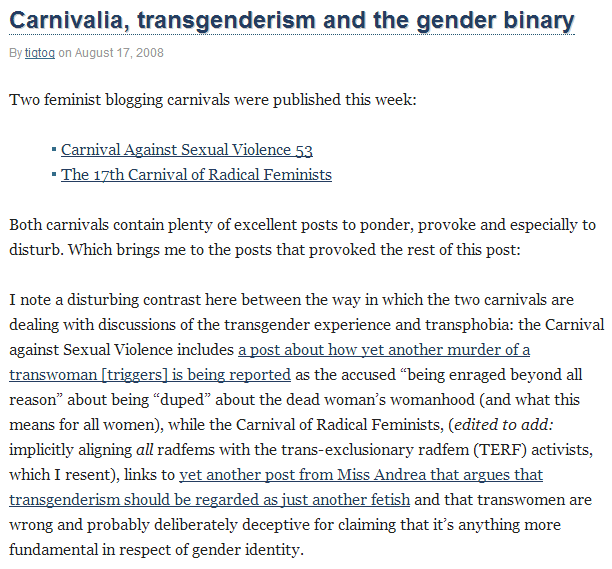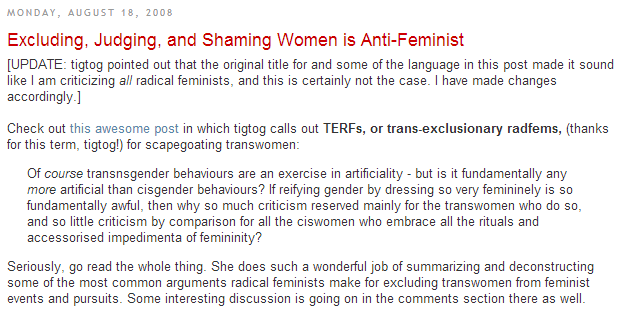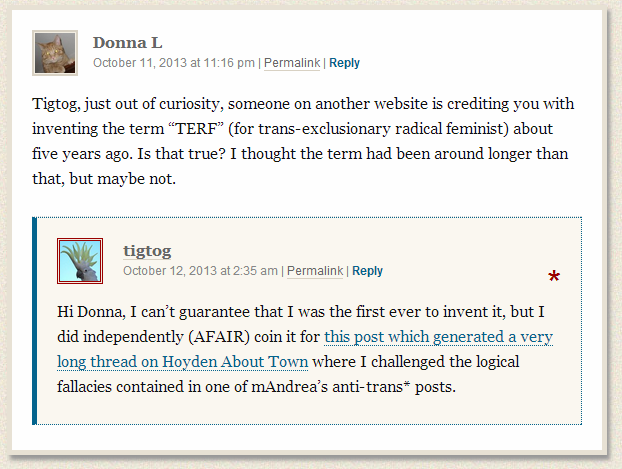Trans Exclusionary Radical Feminists (TERF) are quick to make fact assertions about the term, TERF. According to TERFs, the term is a slur and use of the term makes one a misogynist.
Others assert that the term is insulting, hyperbolic, misleading, and ultimately defamatory.
Allen actually calls for more people to recognize radical feminists as a hate group and then pointedly adopts the term Trans-Exclusionary Radical Feminist (TERF) to refer to them throughout the article. Make no mistake, this is a slur. TERF is not meant to be explanatory, but insulting. These characterizations are hyperbolic, misleading, and ultimately defamatory. They do nothing but escalate the vitriol and fail to advance the conversation in any way.
– Elizabeth Hungerford (2013), TERF attorney and opinion leader
Within feminist and trans discourse, the term refers to a very specific type of person who wraps anti-trans bigotry in the language of feminism. A hallmark of TERF discourse is that it tends to sound a lot like the anti-trans rhetoric coming out of extreme right-wing groups.
Gender Identity Watch (GIW) is viewed as a hate group by thousands and has a history of working with a known hate group. Keep the above assertion made by GIW in mind as you read the following interview I did with one of the cisgender feminists who are responsible for popularizing TERF as a feminist concept.
Defining TERF: interviewing the feminist who popularized it
Cristan Williams: From what I can see, yours is the earliest use. The term has become fairly common in trans discourse.
TigTog: Lauredhel and I are pretty sure that we started using trans-exclusionary radfem (TERF) activists as a descriptive term in our own chats a while before I used it in that post.
C: TERFs have made some assertions about your lexical contribution to feminist discourse. For instance: “TERF is not meant to be explanatory, but insulting. These characterizations are hyperbolic, misleading, and ultimately defamatory.”
T: It was not meant to be insulting. It was meant to be a deliberately technically neutral description of an activist grouping. I notice that since TERF has gone out into the wild, many people seem to use trans-exclusive rather than trans-exclusionary or trans-excluding, and I think that leads to some exploitable ambiguity. It is possible to interpret trans-exclusive as “exclusively talks about trans* issues” (which could quite rightly be considered a slam on the rest of their feminism), while trans-exclusionary is more specific that their exclusion of trans* voices and bodies from being considered women/feminists is the point.
C: I find it interesting that this term originates in the feminist community and was popularized by a cisgender woman. I think the assumption has been that a trans person had coined the term in the last year or so. Was there a specific incident – or a culmination of incidents – that lead you to advocate for the use of this term?
T: We wanted a way to distinguish TERFs from other radfems with whom we engaged who were trans*-positive/neutral, because we had several years of history of engaging productively/substantively with non-TERF radfems, and then suddenly TERF comments/posts seemed to be erupting in RadFem spaces where they threadjacked dozens of discussions, and there was a great deal of general frustration about that. It is possible that one of us picked it or something similar up from an IRC discussion elsewhere and then we both adopted/adapted it for ourselves, perhaps transforming it from some other initialism into an acronym, because we both appreciate the utility of acronyms in simplifying discourse.
C: You seemed to take personal offense over the colonization of the RadFem identity by an anti-trans group. Was this because you identified as a RadFem and/or have friends that were RadFem who were frustrated by a colonization of their feminist identity – that RadFem became synonymous with being anti-trans?
T: Not so much personally offended as pointedly pedantic, although I certainly sympathised with various RadFems I knew who felt that mAndrea and her fellows did not speak for them and were disrupting other discussions with anti-trans* derails. I was still quite actively writing FAQs for the Finally, A Feminism 101 Blog then, so being pedantic about what various strands of feminism were and were not saying was pretty much second nature at the time.
C: Some TERFs have asserted that others do not have a right to make a distinction between TE RadFems (TERFs) and RadFems.
T: The idea that any group can deny others the right to make distinctions between opinions/positions voiced by different members in that group seems utterly absurd. Obviously, nobody can force anybody who voices what others consider TERF stances to self-adopt the TERF label for themselves, but they can always choose another name for their stance which is not held by all other RadFems. After all, RadFem itself is a label chosen by some feminists to distinguish themselves from other feminists, and those feminists felt insulted that what they were doing was not considered sufficiently radical to fall under the RadFem label, see also the womanist/feminist distinction – distinguishing between different arms of activism is what social activist movements do as they grow and develop and react to change within and without.
C: Others assert that the TERF is a slur. How would you respond to such assertions?
T: It was not originally intended as such. Initially the TERF acronym didn’t seem to gain much traction at all, so I never really kept track. Since it’s become in more common usage, no doubt there are some people that use it as a slur. The same thing happened to “radical feminist” and also to “feminist” – any group-identifying word can and will be used as a slur by those who find that group challenging, but that doesn’t mean that the word is fundamentally/always/only a slur.
C: How do you feel about the impact you’ve had in feminist discourse (re: your lexical contribution)?
T: I don’t really know. The acronym was something Lauredhel and I found useful for some of the discussions we were having at the time (and as mentioned above, we aren’t really sure that we invented it as such anyway rather than adopted/adapted it). We thought it might be useful for some others having similar discussions, so we and our co-bloggers shared it around in some of those discussions. That it did eventually catch on and people still find it useful after five years, and that it’s now a label that TERFs feel the need to push back on? It’s certainly intriguing, but I don’t really feel any strong sense of ownership over the term (language is a collective construct which evolves with variant usages, after all). I wanted to communicate something clearly at the time, and it worked for that. That it’s still working for people engaging in that ongoing trans*-inclusion/exclusion debate is certainly satisfying on several levels, definitely.
Unlike tracking transgender as a term, tracking TERF was easier since the term is quite young and was popularized on the internet. What follows is a record of the term’s early usage and uptake:

A few days later, TigTog clarified her position:
Many many radical feminists are trans* accepting and often are active allies. It’s just a small minority who are very vocally trans-exclusionary, particularly online.
Grammatically, the “trans-exclusionary” placed before “radical feminist in the TERF acronym means that it modifies “radical feminist”, describing a subset. Just the way that the term Italian-American doesn’t mean that all Americans are ethnically Italian, it’s just describing a subset of Americans.
– TigTog, 8/20/2008
And from there, the term spread to other feminist blogs:

The following conversation is illuminating:
TigTog:
Thank you for the praise for my post, Tracey. I just wish that this post of yours had a different title and introductory sentence – I’m calling out the trans-exclusionary radfems (TERFs), and I certainly don’t assume that all radfems agree with them. I have a pretty strong radical streak myself after all, and I certainly don’t agree with them.
Tracey:
Point well taken, tigtog. I actually did think twice about that title before I posted this, and I see now that I probably should have followed my instincts. I’ll change it now.
TigTog:
Thanks for the prompt response. I’ve added a clause to my post as well to make this clearer right from the introductory paragraphs.
Thanks too for the link to the post at Womanist Musings – that’s a wonderful post.
Please feel free to adopt and spread the TERF acronym, by the way, if it appeals to you.
TigTog:
Oh, I see you’ve already leapt upon TERF – excellent.
Tracey:
No problem — thank you for pointing it out that it wasn’t clear that I don’t mean all radical feminists. I didn’t want for it to come off that way or to make it sound like that’s what you were saying.
And I loved “TERF”. I was having a hard time finding a way to make that distinction, but that word works perfectly. Thanks again.


TigTog said, “Since it’s become more common [in] usage, no doubt there are some people that use it as a slur. The same thing happened to ‘radical feminist’ and also to ‘feminist’ – any group-identifying word can and will be used as a slur by those who find that group challenging, but that doesn’t mean that the word is fundamentally/always/only a slur.” This insight seems to be generally lost on TERFs. I am sure some people do use TERF as if it were slur in the same way that some TERFs use trans woman as if it were a slur:

Back in 2008, TigTog talked about the colonization of RadFem discourse by TERFs when she said that TERFs were “implicitly aligning all radfems with the trans-exclusionary radfem (TERF) activists, which I resent.” The feminist community named the problem and TERF as a term came into common usage.
I can understand why it’s important to TERFs that people to believe that TERF ideology represents feminism instead of its own ideology:
because the fact of the matter is that unlike born-women, who have everything (literally, everything) to lose from rape culture, transwomen have at least something (everything?) to gain. to a transwoman, cutting off her dick and turning it (inside out) into a fuckhole between her legs makes her feel better. from transwomens own mouths, we know that these fake fuckholes alleviate transwomens suffering. turning their dicks into extra-large condoms for other men to penetrate (or not, whevs…thats my hat-tip to the internet “lesbian transwomen”) actually tamps down their anxiety, and feelings of dysphoria. – TERF blog [Strong TW]
TERF ideology doesn’t speak for women, feminists or RadFems. Now that the feminist community named this specific ideology, it’s more difficult to pass it off as representing anything but itself.
“Transwomen” are not and can never be women or Lesbians – they are simply men, trying to steal our identity and culture… One way to begin to fight their oppressing Lesbians and women is to refuse to give them what they want. At the very least, PLEASE stop calling them “women” in any form, and stop using female pronouns for them… they act like typical men and intimidate and guilt trip – everything is about them. And the hell with any Lesbian who gets in their way. Some have also learned what to say to sound believably female, but if you question a bit further, they revert quickly to male bullying techniques. As for those who do have surgery, men do a lot of bizarre things for sexual gratification, such as strangling themselves to have more exciting orgasms, which has resulted in some unintentional suicides (such as that by David Carradine.)
As Janice Raymond says, “All transsexuals rape women’s bodies by reducing the real female form to an artifact, appropriating their body for themselves.” It’s actually reminiscent of the “Invasion of the Body Snatchers.” – Early TERF leader, author and activist [Strong TW]
When feminists named the movement that spends its time promoting this type of worldview, they acted to stop the colonization of feminism by self-identified RadFems who were fixated on attacking trans people. TigTog said the RadFems she knew felt that TERFs “… did not speak for them and were disrupting other discussions with anti-trans* derails.” TERF isn’t a slur; it’s the feminist community’s response to an unwanted colonization of their feminist space and identity.
To quote the popular feminist group Guerrilla Feminism, “Our feminism is trans inclusive or it is bullshit.”
NOTE: This post originally appeared on the TransAdvocate



